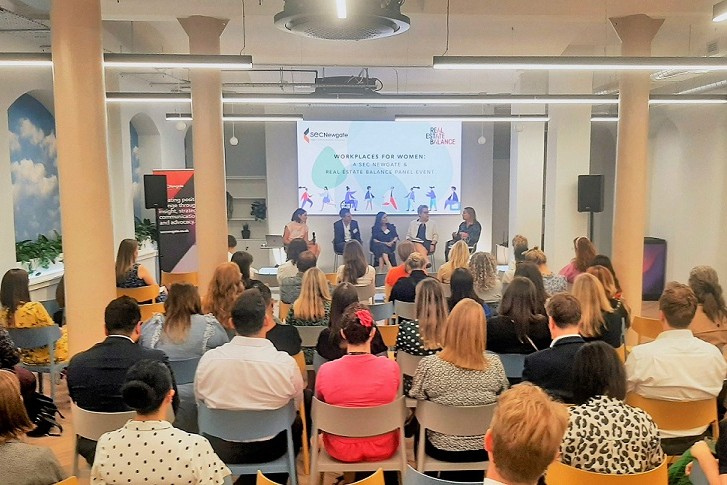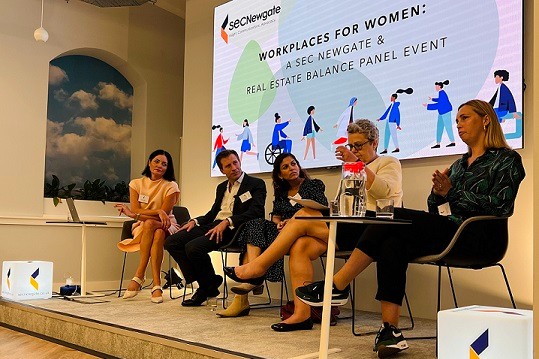By joining Real Estate Balance’s email list, you agree to receive email updates from time to time about organisation news, events being held and information about our partners in accordance with the terms outlined in our privacy notice, which you can read in full here.
Sign upWorkplaces for women

Are we designing, developing and operating our workplaces in a way that ensures accessibility, comfort and security both indoors and in their urban environment?
These and other questions relating to making sure our workplaces are working for women were put to a panel of real estate industry thought leaders at an SEC Newgate and Real Estate Balance event in London on Thursday 13th July.
The strategic communications and advocacy group hosted the event at its Farringdon office, and the audience heard from expert speakers including:
- Laura Leggetter - Practice Head, Communications, SEC Newgate UK (chair)
- Priya Aggarwal-Shah - Founder and Director, BAME in Property
- Simon Carter, CEO, British Land
- Sue Brown - Managing Director, Real Estate Balance
- Natalie Smith - Principal, Perkins & Will
Laura started by asking about gender balance in the real estate industry, given it is those professionals who design and deliver our workspaces, and Sue was able to draw upon some of the findings in our recent Industry DEI Survey, which included the stark drop-off of women at senior leadership level compared to the better balance elsewhere.
Simon, speaking on the day British Land and Landsec released their landmark recommendations on how to make the planning system work more effectively for urban regeneration, shared his views on the sound business case behind diversity and inclusive practices.
Our purpose as an organisation is to create places which appeal to the widest range of people, and that makes complete commercial sense. We have an office business, and our office customers want to get talent from the broadest pool, and we have a retail business, and our retail customers want to have the biggest markets possible. The rationale for thinking about how spaces work for women is absolutely there.
Simon Carter
Laura asked Priya about some of the day-to-day issues and physical obstacles facing women at work and she highlighted air-conditioning, seating, PPE sizes and shelving height as important things to think about. She also shared an anecdote that when she raised concerns about the shelves being too high for people including wheelchair users and pregnant women in a previous role, the office manager provided a stepladder as the ‘solution’.
Natalie discussed the importance of architecture and interior design in making workplaces suitable for women and also engaging with the people who use the space. On one such recent exercise, the suggestions included making sure there was always a security guard on-site and having clear lines of visibility and avoiding hidden spaces. She added that another initiative her firm was working on is a move towards creating safer more connected business parks, with well-lit public spaces and central amenities, creating vibrant sites that encourage use beyond the typical car-to-desk journey.
Priya agreed with the importance of engagement with stakeholders and suggested a simple way to do this is to include a question or two about interactions with the physical space in annual appraisals or employee pulse surveys. Natalie also discussed the relevance of including local communities in gender-equitable design and development. Simon said that employment, education and skills are three important pillars of social impact and communities at British Land.

The panellists then moved in to discuss the role of the supply chain and procurement processes in improving workplaces for women. They agreed that the industry in general needs to do more in providing opportunities and representing the diversity our communities. On architecture specifically, Sue raised the point that it is still unbalanced in terms of gender, although less so in younger architects and the new generation. On one project she worked on, she said that the demands on the architects were so severe that it meant they were having to work long and unsociable hours. She added that modern developments such as hybrid working were having an impact on diversity and inclusivity in the sector.
Sue also expressed her view that it is vital for the tech sector to embrace D&I, particularly when it comes to gender, to ensure smart technology in office buildings was not just being designed by and for men.
Laura asked Priya about how the industry can elevate more women to senior leadership roles, and Priya suggested that technology needs to improve to make hybrid meetings more comfortable, bigger companies need to consider having childcare facilities to support their employees who are working parents and also enhanced parental leave policies as a means of encouraging fathers to take more paternity leave.
Quite a lot of these challenges that women deal with when it comes to senior leadership can be dealt with through improvements to hybrid, greater flexibility, progressive policies and potentially even job shares which could be managed by women as a way of balancing their career and family life.
Priya Aggarwal-Shah
Natalie raised the point that there is a lot of good work being done when it comes to work places for women. This includes published guidance relating to menopause, temperature controlled individual rooms, well-designed parent rooms in offices and also the understanding that social spaces are key to the sense of belonging and particularly important for women returning from maternity leave.
Thank you to Laura, Priya, Simon and Natalie and Ben, Emily and everyone at SEC Newgate and also to everyone who attended for contributing to this event on such as insightful and important topic.